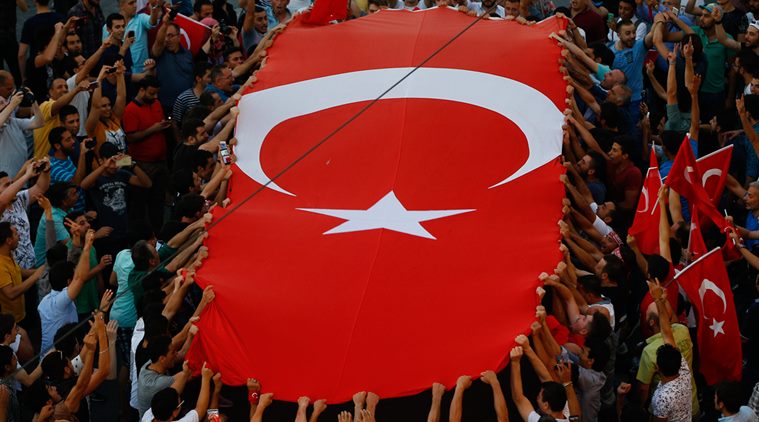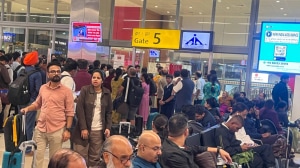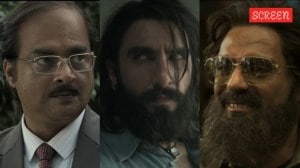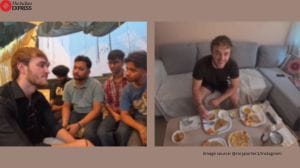Soumyajit Mazumdar had landed in Istanbul along with 40 others on the afternoon of July 15 to shoot for a Bengali feature film. No soon had the Indian entertainment crew started their one-month long Turkish schedule that they received news of political disturbance on the streets of Istanbul and the prospect of cancellation of their shoot.
“My friend and I had planned out a trip to the Bosphorous bridge the evening of our arrival, but had to stay on at our hotel rooms since we could not get a bus. At around late evening, my friend from India started messaging me enquiring about an army coup,” says Mazumdar.

In the evening, Turkey witnessed a bloody coup organised by its army to overthrow President Tayyip Erdogan in the name of reclaiming democracy. Turkey is hardly a novice to army coups. Since 1960, the army has staged five coups in the name of defending democracy and secularism of the kind visualised by the Republic’s founding father, Kemal Attaturk. However, for an Indian from Kolkata, the prospect of a major city getting occupied by the military within a matter of few hours is definitely befuddling. Mazumdar spoke to Indianexpress.com to discuss his experience of being an outsider, stuck in the failed military coup in Turkey.
 People attend wounded persons near Bosphorus Bridge (background) during an attempted coup in Istanbul (REUTERS)
People attend wounded persons near Bosphorus Bridge (background) during an attempted coup in Istanbul (REUTERS)
“As the evening progressed, we started getting frantic calls from friends and family in India. My family had slept. By the time they woke up, all phone lines were jammed and there was no way for them to contact me. Our shoot the following day got cancelled. The Indian Embassy asked us to stay in.”
A group within the Turkish military had taken control over key regions, used guns, army tanks and helicopters in its attempt to bring down President Erdogan. Violent clashes had broken out on to the streets ending in a death toll of 194 along with about 1,100 being injured.
However, the Turkish military was far from successful from its attempt at toppling the President. While Erdogan appealed to the citizens to take to the streets, opposing forces within the military and those in favour of the President managed to fight back with the coup organisers to restore normalcy.
“We stepped out the following day and our work was back on track. The Turkish president asked people to take to the streets, which they did. We saw people shouting slogans of peace and democracy.
 Ankara: Turkey’s President Recep Tayyip Erdogan addresses a group of lawmakers from the ruling party at the parliament in Ankara, Turkey, (Source: AP/PTI)
Ankara: Turkey’s President Recep Tayyip Erdogan addresses a group of lawmakers from the ruling party at the parliament in Ankara, Turkey, (Source: AP/PTI)
Erdogan had come back to power in 2015 winning over 50 per cent of the votes. In the ensuing months after his victory, he has often been accused of Islamization in Turkey as he clamped down upon free speech and tried to ensure a more religious content in Turkish education. The Turkish army on the other hand claim to be defenders of secularism. But the fact that Turkish citizens wholeheartedly preserved the authority of Erdogan does raise questions about the validity of claims to western secularism that the country maintains.
“On interacting with people here I realized that the country’s president is conservative while the army is seen as liberal. However, even those who do not support the president and his efforts at Islamization want peace to be retained in the country. Hence they were completely opposed to the coup.”
Islam remains the religion of the majority in Turkey. However, unlike most other Islamic countries, the Republic of Turkey, since its inception in 1923 has been on a steady course towards Europeanization. The strands of conservative Islam evident in any Muslim majority country is starkly missing in Turkey and is quite noticeable to a foreigner.
“I met with a lady on the bus who mentioned to me that the problem with Turkey is that we are liberal Muslims. I visited the Blue mosque and was surprised to find that there was no religious rules on entering the mosque like covering your head, which is common in any other mosque world over. Overall the atmosphere in Turkey is very European.”
From the view of an outsider, Turkey’s safeguard of an Islamic leader’s authority in a predominant western atmosphere would appear perplexing. However, Mazumdar goes on to observe that while the overall mood in the country might be secular, there is also a spirit of nationalistic fervour that is so conspicuous and is in his opinion, one of the prime reasons why the coup was unsuccessful.
 Mazumdar goes on to observe there is a spirit of nationalistic fervour that is so conspicuous and is in his opinion, one of the prime reasons why the coup was unsuccessful. (Picture: Soumyajit Mazumdar)
Mazumdar goes on to observe there is a spirit of nationalistic fervour that is so conspicuous and is in his opinion, one of the prime reasons why the coup was unsuccessful. (Picture: Soumyajit Mazumdar)
“I noticed that every other building in Turkey hoists a national flag. This mood of patriotism is not so apparent in India, perhaps because of our versatility. There is an atmosphere of patriotism in Turkey which in belief has been able to overcome the coup.”
Story continues below this ad
As Mazumdar and his team continue with their shoot as scheduled in Turkey, a state of emergency has been declared in the country for a period of three months. Private schools, charities and other institutions have been shut down. Public transport has been made free of cost and banners are hung all over Istanbul with words that say “Hakimiyet Millentindir” (The people rule).

 For an Indian from Kolkata, the prospect of a major city getting occupied by the military within a matter of few hours is definitely befuddling. (AP Photo/Emrah Gurel)
For an Indian from Kolkata, the prospect of a major city getting occupied by the military within a matter of few hours is definitely befuddling. (AP Photo/Emrah Gurel)
 People attend wounded persons near Bosphorus Bridge (background) during an attempted coup in Istanbul (REUTERS)
People attend wounded persons near Bosphorus Bridge (background) during an attempted coup in Istanbul (REUTERS) Ankara: Turkey’s President Recep Tayyip Erdogan addresses a group of lawmakers from the ruling party at the parliament in Ankara, Turkey, (Source: AP/PTI)
Ankara: Turkey’s President Recep Tayyip Erdogan addresses a group of lawmakers from the ruling party at the parliament in Ankara, Turkey, (Source: AP/PTI) Mazumdar goes on to observe there is a spirit of nationalistic fervour that is so conspicuous and is in his opinion, one of the prime reasons why the coup was unsuccessful. (Picture: Soumyajit Mazumdar)
Mazumdar goes on to observe there is a spirit of nationalistic fervour that is so conspicuous and is in his opinion, one of the prime reasons why the coup was unsuccessful. (Picture: Soumyajit Mazumdar)





























